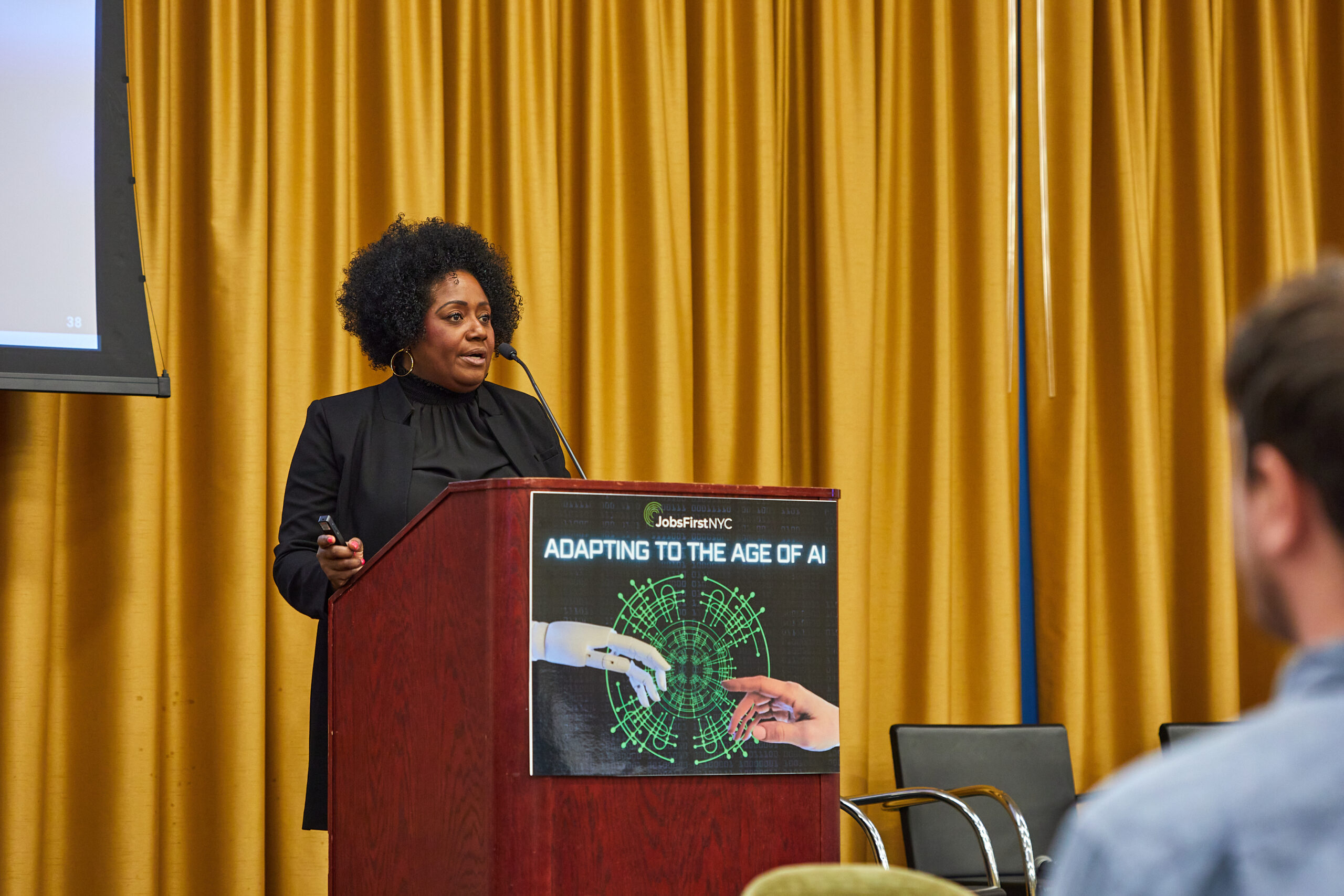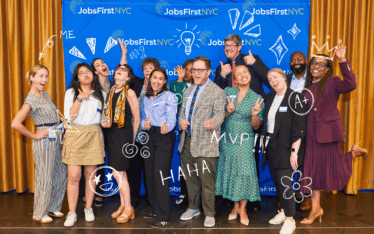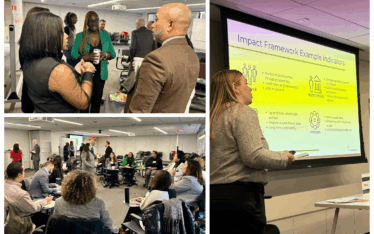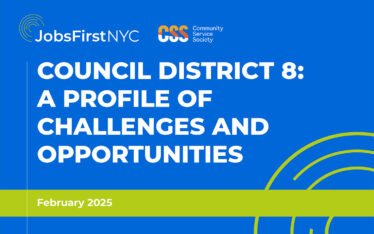Professor Renée Cummings of the University of Virginia addresses the audience at Baruch College.
On April 17, 2024, professionals from across the New York City workforce development ecosystem listened with rapt expressions as Professor Renée Cummings, Fellow at All Tech is Human, kicked off JobsFirstNYC’s first-ever Adapting to the Age of AI convening. “AI is a revolutionary technology that’s transforming every industry, every sector, every discipline, every business model,” stated the award-winning activist and scholar, “we’ve got to think about how AI is going to impact New York City and how New York City is going to impact AI.”
New York in the Age of AI and Generative AI
In her state of play for the Empire State, Cummings laid out a high-level overview of recent AI legislation, from the deployment of the city’s AI strategy in October 2021 to the release of the 2023 AI Action Plan to the launch of Empire AI in January 2024. In addition to leading the way in terms of AI legislation, Cummings highlighted that New York actually leads in AI employment opportunities as well. “[New York] is ranked #1 in AI job roles and has exceeded the Bay area in AI job postings. Currently, there are over 335,000 employed in the tech ecosystem,” she noted.
Although AI presents immense opportunities, Cummings underscored the necessity of designing responsible AI systems that are “rights-based” and “risks-based” and grounded in public trust, legitimacy and integrity. This call to action was echoed by the formidable line-up of researchers, policymakers, educators and industry leaders who presented throughout the day.
AI in Action: Shaping Our Future Workforce
In the opening panel, AI in Action: Shaping Our Future Workforce, Chymeka Olfonse, Managing Director of Adults and Household Supports at Robin Hood, moderated a conversation about the impact of AI on the younger workforce, and strategies to optimize new career pathways and enhanced learning. Vidya Bharadwaj, Director of Education at Encode Justice, Joahna Kuiper Responsible AI Business Strategy Global Lead at Salesforce and Rebekkah Hogan AI Program Management Lead at Meta delved into key issues around data privacy and bias in algorithms. The panelists also highlighted the tremendous need for a multi-disciplinary approach to AI. “This tech behaves differently,” said Kuiper, when speaking to the importance of building AI knowledge outside of an organization’s IT department. “Leaving tech to just the technologists gives them the power to make decisions.” The other panelists echoed the importance of investing in AI literacy across the board—everyone should have a basic understanding of AI technologies, how they work, where they’re used and how they might perpetuate bias. “It’s not complicated for us to learn, if we break it down,” added Bharadwaj, whose youth-led organization, Encode Justice, has been guiding the way through their AI and ethics curriculum for teachers and students.

Chymeka Olfonse, Rebekkah Hogan, Vidya Bharadwaj, and Joahna Kuiper discuss AI’s implications on the younger workforce.
AI Adoption in the Mission-Driven Sector
This need for organizational investment in AI education, particularly in the nonprofit sector, was starkly highlighted by the following data discussion led by Jaclyn Kelly and Sam Neylon, Director and Research Associate at the NYC Labor Market Information Service, a research center housed within the Center for Urban Research at the CUNY Graduate Center. The researchers debuted their findings from a recent survey on AI adoption in the mission-driven sector. Of the 125 respondents, only 62% said they had used AI at work. Given that AI technology is embedded in many of the everyday tech tools we use, Kelly interpreted this as 62% of folks were intentionally using AI tools at work. The biggest barrier to AI adoption? A lack of time. “Over 50% of the respondents who said they don’t use AI at work, said they haven’t done so because they don’t have time,” said Kelly. Although resource constraints present a barrier, the mission-driven sector sees a clear need for building AI literacy. In fact, 63% of respondents said it was extremely important that AI training be included in college curriculums. Kelly and Neylon will continue to present the findings to other stakeholder groups while they explore the potential expansion of the survey and changes over time.
AI and Policy: Navigating the Intersection of Technology and Governance
While the policy implications of AI were discussed throughout the day, the last panel specifically focused on this topic. B Cavello, Director of Emerging Technology at the Aspen Institute led a conversation with Elan Silver Legislative Counsel at the Office of State Senator Kristen Gonzalez and Bledi Taska, Head of Analytics at SkyHive. Silver highlighted the challenges of designing policies that are both comprehensive and flexible enough to keep up with the rapidly changing capabilities of the technology, the ways in which AI is already being used in government systems (in the systems that disburse SNAP benefits, for example), and an example from Northwell Health in which AI has been successfully used to supplement radiologist’s work with meaningful human oversight. “At least in the short and medium term, AI is not taking jobs,” emphasized Taska, “but its changing jobs.” He added that, in certain cases, generative AI can act as a co-pilot or a guide and democratize opportunity for people who may be less skilled. To capitalize on this opportunity, Silver pointed out the necessity of implementing basic access to hardware and Internet to address the already existing digital divide: “We have to ensure that we focus on implementing the basics as far as access goes” said Silver.

B Cavello, Bledi Taska, and Elan Silver examine governance’s place in conversation around technology and AI.
Fostering Connections for New Generations of Workforce and Education Programs
The day ended with a moment of reflection and a call to action. Participants were encouraged to identify the next AI training to bring to their teams, the next forum to attend or advocacy group to join to stay engaged on these issues. They carried these commitments into the final networking session, where they connected with other attendees, digested and discussed the conversations of the day and experienced emerging technology in action at demo stations provided by Transfr and Meta.
This convening set a powerful tone for the workforce development sector. As leaders in the mission-driven sector, JobsFirstNYC is committed to the system-level work required to not only react to these technological advances, but to actively shape tech’s trajectory towards equity, towards inclusion, and towards belonging. As a team, we have begun our own work to educate ourselves on the various nuances and implications of AI technologies and identify how we will implement it responsibly and equitably in our processes and programs. Through this journey, we look forward to sharing learnings and challenges with our partners as we collectively design the next generation of education and workforce programs in this age of AI.

Marjorie Parker, CEO and President, speaks to the conference attendees.





